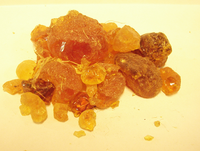- Al-Muizz ibn Badis
-
Al-Muizz ibn Badis (Arabic: المعز بن باديس); 1008–1062) was the fourth ruler of the Zirids in Ifriqiya, reigning from 1016 to 1062.
Al-Muizz ascended the throne as a minor following the death of his father Badis ibn Mansur, with his aunt acting as regent. In 1016 there was a bloody revolt in Ifriqiya in which the Fatimid residence Al-Mansuriya was completely destroyed and 20,000 Shiites were massacred. The unrest forced a ceasefire in the conflict with the Hammadids of Algeria, and their independence was finally recognized in 1018.
Al-Muizz took over the government in 1022 following the overthrow of his aunt. The relationship with the Fatimids was strained, when in 1027 they supported a revolt of the Zanatas in Tripolitania which resulted in permanent loss of control of the region. His son Abdallah shortly ruled Sicily in 1038-1040, after intervening with a Zirid army in the civil war that broke out in the island.
The political turmoil notwithstanding, the general economic wellbeing initially made possible an extensive building programme. However, the kingdom found itself in economic crisis in the 1040s, reflected in currency devaluation, epidemic and famine. This may have been related to the high level of tribute which the Zirids were compelled to pay annually to the Fatimids (one million gold dinars a year).
When al-Muizz, under the influence of Sunni jurists in Kairouan, recognised the Abbasids in Baghdad as rightful Caliphs in 1045, the break with the Fatimids was complete.
The Fatimids then deported the Bedouin tribes of the Banu Hilal and the Banu Sulaym from Egypt to Ifriqiya. The invasion of the Bedouin (1051–1052) led to great hardship after the defeat at Jabal Haydaran, severely impacting agriculture in Ifriqiya. The conquest of Kairouan in 1057 resulted in further anarchy. The Zirids lost control over the hinterland and were only able to retain the coastal areas, the capital being moved to Mahdia. With the growth of Bedouin Emirates and the continuing insecurity inland, the economy of Ifriqiya looked increasingly towards the Mediterranean, with the result the coastal cities grew in importance through maritime trade and piracy.
Attributed Works
He is usually thought to be[1] the author of the famous Kitab `umdat al-kuttab wa `uddat dhawi al-albab (Staff of the Scribes). It is divided in twelve chapters, writes amongst others on the excellence of the pen, he wrote on the preparation of types of inks, the preparation of colored inks, metallic inks (including ones prepared from silver filings and alcohol), the coloring of dyes and mixtures, secret writing, the making of paper and the Arabic gum and glue.[2][3]
Al-Muizz was succeeded by his son Tamim ibn Muizz.
References
- ^ Levey, Martin (1962). "Mediaeval Arabic Bookmaking and Its Relation to Early Chemistry and Pharmacology". Transactions of the American Philosophical Society. New Series 52 (4): 1–79. ISSN 0065-9746. JSTOR 1005932.
- ^ http://www.muslimheritage.com/topics/default.cfm?ArticleID=224
- ^ http://www.history-science-technology.com/Articles/articles%2072.htm
Categories:- Monarchs
- History of North Africa
- 1008 births
- 1062 deaths
- Chemists
- Alchemists
Wikimedia Foundation. 2010.

